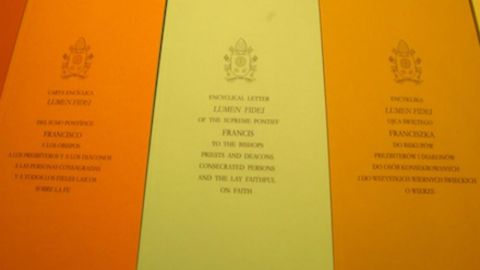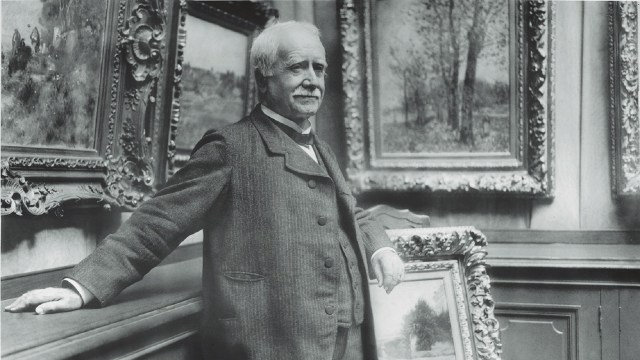The Papal Encyclical’s Attack on Technology, Wealth, and the ‘Technocratic Paradigm’

Most of the early attention given to the Papal Encyclical on the Environment focused on Pope Francis’ remarks about climate change; that it’s real and humans are the cause…
a number of scientific studies indicate that most global warming in recent decades is due to the great concentration of greenhouse gases (carbon dioxide, methane, nitrogen oxides, and others) released mainly as a result of human activity.
… and that dramatic change is necessary to combat it …
Humanity is called to recognize the need for changes of lifestyle, production and consumption, in order to combat this warming or at least the human causes which produce or aggravate it.
It is of course those changes, not the science of climate change itself, that leads some to deny the overwhelming evidence Pope Francis cites, denial that prompted some conservatives to essentially tell the pope to butt out on the issue. Which explains why that part of the Papal message got much of the early attention.
The climate change issue, however, gets all of four paragraphs out of 246 in the 184-page document. (Biodiversity gets 11. Clean water gets five.) The pope’s message on the environment is about far broader themes, mostly religious (of course), with much longer expositions under headings like
THE MESSAGE OF EACH CREATURE IN THE HARMONY OF CREATION
THE MYSTERY OF THE UNIVERSE
THE LIGHT OFFERED BY FAITH
A UNIVERSAL COMMUNION
THE GAZE OF JESUS
But in THE HUMAN ROOTS OF THE ECOLOGICAL CRISIS, the pope is pretty clear where those roots lie. The BIG enemy, he says, is a world under the control of the Technocratic Paradigm. Not technology per se, but the rich few who use technology for power and profit, who don’t share fairly, and who in their selfishness ignore the harm their greed does to the rest of humanity, especially the poor and powerless, as well as to the environment.
The alliance between the economy and technology ends up sidelining anything unrelated to its immediate interests.
The technocratic paradigm … tends to dominate economic and political life. The economy accepts every advance in technology with a view to profit, without concern for its potentially negative impact on human beings. Finance overwhelms the real economy.
We have to accept that technological products are not neutral, for they create a framework, which ends up conditioning lifestyles and shaping social possibilities along the lines dictated by the interests of certain powerful groups.
In several places, the Encyclical blames the state of the natural world on
The culture of consumerism, which prioritizes short-term gain and private interest.
But that culture is not the fault of us consumers, the pope writes. Blame excessive consumption on the evil Technocratic Paradigm. We’re all dupes of the market.
Compulsive consumerism is one example of how the techno-economic paradigm affects individuals.
Pope Francis, a trained chemist, tries not to make science and technology the villains.
It is right to rejoice in these advances and to be excited by the immense possibilities which they continue to open up before us, for science and technology are wonderful products of a God-given human creativity.
Specifically on the issue of agricultural biotechnology — genetic modification of food — which has vast potential for improving food security and nutrition for billions of people, particularly the poor, the pope at first sounds supportive;
The Church values the benefits which result “from the study and applications of molecular biology, supplemented by other disciplines such as genetics, and its technological application in agriculture and industry.”
But even when discussing a technology he specifically supports, there is a, “Yeah, but … it could be used a as tool for the evil Technocratic Paradigm.” He fears that agricultural biotechnology could empower ‘an expansion of oligopolies for the production of cereals and other products’ and concentrate land and power ‘in the hands of a few owners.’ Now Pope Francis sounds more like he’s writing posters for the March Against Monsanto.
And he sounds more worried about the use of technology as a tool of power than he is excited by its potential to solve human and environmental problems.
in the most radical sense of the term power is (technology’s) motive — a lordship over all. As a result (of technology), “man seizes hold of the naked elements of both nature and human nature.”
This is all part and parcel of the pope’s rejection of market mechanisms, because they are under the control of the wealthy Technocratic Paradigm, as tools to help create a more sustainable economy.
… the market tends to promote extreme consumerism in an effort to sell its products; people can easily get caught up in a whirlwind of needless buying and spending.
There are too many special interests, and economic interests easily end up trumping the common good.
So taken as a whole, Pope Francis’ provocative Encyclical is far more than just about the environment. It is essentially preaching of deep moral values — attacking concentrated wealth, advocating for fairness on behalf of the poor — more than a specific or realistic call for achievable change. It’s easy to agree with many of the pope’s moral views, but hard to see how such a radical call for popular acceptance of significant reductions in material consumption and for redistribution of the world’s wealth and power — “The time has come to accept decreased growth in some parts of the world, in order to provide resources for other places to experience healthy growth” — has any hope of actually helping.
What does have a shot at helping is Pope Francis’s direct rejection of the increasingly popular view that nature and humans are separate and that humans and all we do are nothing more than a threat to the natural world. Such appealing, but childish environmentalist simplicity blocks progress and potential solutions. More on that aspect of the Encyclical in the next essay.





